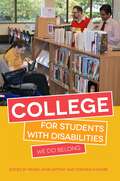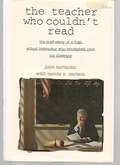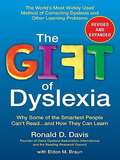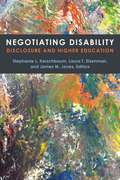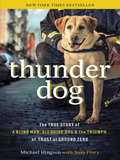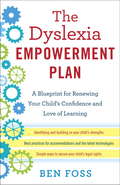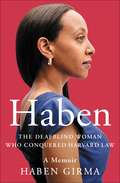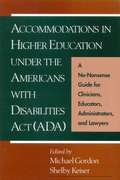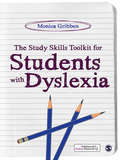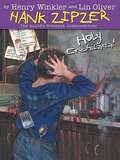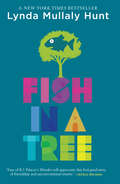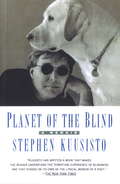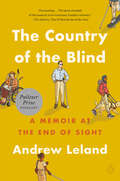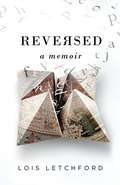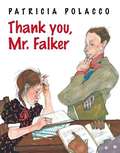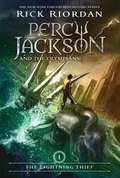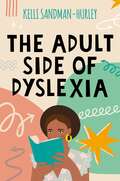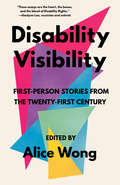Special Collections
2025 Accessibility and Dyslexia Awareness
Description: An eclectic collection themed around accessibility and dyslexia, the difficulties and triumphs.
- Table View
- List View
College for Students with Disabilities
by Temple Grandin and Stephen M. Shore and Ehrin Mchenry and Dena Gassner and Mitchell Nagler and Francine Conway and Anita Frey and Alyssa L. Conigliaro and Chanelle Tyler Best and Karleen Haines and Sonia Minutella and Kelsey Mclaughlin and Melissa Mooney and Patrick Kelty and Pavan John Antony and Diana Damilatis and Kerry MagroSharing the personal stories of individuals with disabilities who describe both the challenges and successes of their time in higher education, and with a major section on the findings of broad ranging research into the experiences of such students, the book explores the current situation, what works, and how things can be improved.
"You are not college material" or "you don't belong in college" are comments frequently heard by students with disabilities. Despite this, college education is now an expected part of the transition to adulthood for many individuals with disabilities. The book includes practical advice to encourage self-advocacy in students with disabilities, and to support the professionals who are facing the challenges alongside them.
Covering cerebral palsy, autism spectrum disorders, intellectual disabilities, and much more, this is vital reading for parents, individuals with disabilities, school teachers, college professors, and professionals working with adults with disabilities.
The Teacher Who Couldn't Read
by Carole C. Carlson and John CorcoranHere is the incredible true story of a smart kid who slipped through the system and became part of it. John Corcoran graduated from high school and college and went on to become a high school teacher--but he never learned how to read. Corcoran shares his amazing experiences of using deception to survive in a world of literates, and he clearly defines what schools, teachers, churches, and parents can do to conquer the little-known but widely spread disease of our educational system: illiteracy.
The Gift of Dyslexia, Revised and Expanded
by Davis and Ronald D.The revised, updated, and expanded edition of the classic in the category. This book outlines a unique and revolutionary program with a phenomenally high success rate in helping dyslexics learn to read and to overcome other difficulties associated with it. This new edition is expanded to include new teaching techniques and revised throughout with up-to-date information on research, studies, and contacts.
Negotiating Disability
by Stephanie L Kerschbaum and Laura T Eisenman and James M JonesDisability is not always central to claims about diversity and inclusion in higher education, but should be. This collection reveals the pervasiveness of disability issues and considerations within many higher education populations and settings, from classrooms to physical environments to policy impacts on students, faculty, administrators, and staff. While disclosing one’s disability and identifying shared experiences can engender moments of solidarity, the situation is always complicated by the intersecting factors of race and ethnicity, gender, sexuality, and class. With disability disclosure as a central point of departure, this collection of essays builds on scholarship that highlights the deeply rhetorical nature of disclosure and embodied movement, emphasizing disability disclosure as a complex calculus in which degrees of perceptibility are dependent on contexts, types of interactions that are unfolding, interlocutors’ long- and short-term goals, disabilities, and disability experiences, and many other contingencies.
Thunder Dog
by Larry King and Michael Hingson and Susy FloryFaith. Trust. Triumph.
"I trust Roselle with my life, every day. She trusts me to direct her. And today is no different, except the stakes are higher." ?Michael Hingson
First came the boom?the loud, deep, unapologetic bellow that seemed to erupt from the very core of the earth. Eerily, the majestic high-rise slowly leaned to the south. On the seventy-eighth floor of the World Trade Center's north tower, no alarms sounded, and no one had information about what had happened at 8:46 a.m. on September 11, 2001?what should have been a normal workday for thousands of people. All that was known to the people inside was what they could see out the windows: smoke and fire and millions of pieces of burning paper and other debris falling through the air.
Blind since birth, Michael couldn't see a thing, but he could hear the sounds of shattering glass, falling debris, and terrified people flooding around him and his guide dog, Roselle. However, Roselle sat calmly beside him. In that moment, Michael chose to trust Roselle's judgment and not to panic. They are a team. Thunder Dog allows you entry into the isolated, fume-filled chamber of stairwell B to experience survival through the eyes of a blind man and his beloved guide dog. Live each moment from the second a Boeing 767 hits the north tower, to the harrowing stairwell escape, to dodging death a second time as both towers fold into the earth.
It's the 9/11 story that will forever change your spirit and your perspective. Thunder Dog illumiates Hingson's lifelong determination to achieve parity in a sighted world, and how the rare trust between a man and his guide dog can inspire an unshakable faith in each one of us.
The Dyslexia Empowerment Plan
by Ben FossFinally, a groundbreaking book that reveals what your dyslexic child is experiencing--and what you can do so that he or she will thrive. More than thirty million people in the United States are dyslexic--a brain-based genetic trait, often labeled as a "learning disability" or "learning difference," that makes interpreting text and reading difficult. Yet even though children with dyslexia may have trouble reading, they don't have any problems learning; dyslexia has nothing to do with a lack of intellect.
While other books tell you what dyslexia is, this book tells you what to do. Dyslexics' innate skills, which may include verbal, social, spatial, kinesthetic, visual, mathematical, or musical abilities, are their unique key to acquiring knowledge. Figuring out where their individual strengths lie, and then harnessing these skills, offers an entrée into learning and excelling. And by keeping the focus on learning, not on standard reading the same way everyone else does, a child with dyslexia can and will develop the self-confidence to flourish in the classroom and beyond.
After years of battling with a school system that did not understand his dyslexia and the shame that accompanied it, renowned activist and entrepreneur Ben Foss is not only open about his dyslexia, he is proud of it. In The Dyslexia Empowerment Plan he shares his personal triumphs and failures so that you can learn from his experiences, and provides a three-step approach for success:
Identify your child's profile: By mapping your child's strengths and weaknesses and assisting her to better understand who she is, you can help your child move away from shame and feelings of inadequacy and move toward creating a powerful program for learning.
Help your child help himself: Coach your child to become his own best advocate by developing resiliency, confidence, and self-awareness, and focusing on achievable goals in areas that matter most to him.
Create community: Dyslexic children are not broken, but too often the system designed to educate them is. Dare to change your school so that your child has the resources to thrive. Understanding your rights and finding allies will make you and your child feel connected and no longer alone.
Packed with practical ideas and strategies dyslexic children need for excelling in school and in life, this empowering guide provides the framework for charting a future for your child that is bright with hope and unlimited potential.
Haben
by Haben GirmaThe incredible life story of Haben Girma, the first Deafblind graduate of Harvard Law School, and her amazing journey from isolation to the world stage.
Haben grew up spending summers with her family in the enchanting Eritrean city of Asmara. There, she discovered courage as she faced off against a bull she couldn't see, and found in herself an abiding strength as she absorbed her parents' harrowing experiences during Eritrea's thirty-year war with Ethiopia. Their refugee story inspired her to embark on a quest for knowledge, traveling the world in search of the secret to belonging. She explored numerous fascinating places, including Mali, where she helped build a school under the scorching Saharan sun. Her many adventures over the years range from the hair-raising to the hilarious.
Haben defines disability as an opportunity for innovation. She learned non-visual techniques for everything from dancing salsa to handling an electric saw. She developed a text-to-braille communication system that created an exciting new way to connect with people. Haben pioneered her way through obstacles, graduated from Harvard Law, and now uses her talents to advocate for people with disabilities.
HABEN takes readers through a thrilling game of blind hide-and-seek in Louisiana, a treacherous climb up an iceberg in Alaska, and a magical moment with President Obama at The White House. Warm, funny, thoughtful, and uplifting, this captivating memoir is a testament to one woman's determination to find the keys to connection.
Accommodations in Higher Education under the Americans with Disabilities Act
by Michael Gordon and Shelby Keiser and Alta LapointThis manual outlines how the ADA applies to a wide range of mental and physical impairments within higher education settings, it outlines a series of fundamental principles and actual clinical/administrative procedure
The Study Skills Toolkit for Students with Dyslexia
by Monica Gribben'This toolkit is the student's safety net offering user friendly, down to earth advice and real life skills that have been tried and tested by the author'-Dr John Schneider, Educational Psychologist, Edinburgh 'This is exactly how I felt starting university ... a wonderful and very helpful book full of interesting and useful hints and tips on how to survive university as a dyslexic student. It doesn't make you feel silly or stupid but makes you feel you can achieve what you set out to do'-Sharon Patterson, Adult Nursing student, Edinburgh Napier University 'You realize you're in the hands of a professional who has taught thousands of students how to succeed at university'-Holly Pellicer, Dyslexia Advisor, University of Oslo Packed with helpful advice, checklists and templates, this book will help you improve your study skills throughout your time at university. Written in a straightforward, no- nonsense style, the guidance can be broken down into manageable chunks. Issues covered include: - procrastination - planning your assignment - understanding your essay question - researching, writing and referencing your written work - managing your own well-being. Drawing on years of experience running study skills workshops in higher education, Monica Gribben has written an accessible book for students with dyslexia that shows how to work through the challenges that studying presents. The companion Website www.sagepub.co.uk/gribben has podcasts, worksheets and electronic resources to support each chapter. Monica Gribben is a private dyslexia consultant and Dyslexia Adviser at Edinburgh Napier University.
Holy Enchilada!
by Henry Winkler and Lin Oliver and Tim HeitzPS 87 is having multicultural week, and Ms. Adolf's class is putting on a "Foods from Around the World" luncheon. Hank is thrilled, no reading, no outlining, and no review questions, just cooking! Hank makes enchiladas, and at the luncheon, Ms. Adolf piles her plate with lots of food. But after a few bites, her face turns bright red. One of the dishes is super-spicy!
Ms. Adolf accuses someone of playing a mean practical joke, and punishes the entire class with no recess until the guilty party comes forward. Hank realizes his trouble with numbers might have caused the problem. What if he accidentally used three cups of peppers instead of 1/3 cup? Will Hank be able to get recess back for everyone without getting detention for the rest of his life?
Lexile Level: 750L
Fish in a Tree
by Lynda Mullaly HuntA New York Times Bestseller
An emotionally-charged, uplifting novel that will speak to anyone who’s ever thought there was something wrong with them because they didn’t fit in. “Everybody is smart in different ways. But if you judge a fish by its ability to climb a tree, it will live its life believing it is stupid.”
Ally has been smart enough to fool a lot of smart people. Every time she lands in a new school, she is able to hide her inability to read by creating clever yet disruptive distractions. She is afraid to ask for help; after all, how can you cure dumb? However, her newest teacher Mr. Daniels sees the bright, creative kid underneath the trouble maker. With his help, Ally learns not to be so hard on herself and that dyslexia is nothing to be ashamed of. As her confidence grows, Ally feels free to be herself and the world starts opening up with possibilities. She discovers that there’s a lot more to her—and to everyone—than a label, and that great minds don’t always think alike.
Schneider Family Book Award
ALA Notable
Global Read-Aloud Selection
Crystal Kite Nerdy Book Award
Planet of the Blind
by Stephen Kuusisto"The world is a surreal pageant," writes Stephen Kuusisto. "Ahead of me the shapes and colors suggest the sails of Tristan's ship or an elephant's ear floating in air, though in reality it is a middle-aged man in a London Fog rain coat which billows behind him in the April wind."
So begins Kuusisto's memoir, Planet of the Blind, a journey through the kaleidoscope geography of the partially-sighted, where everyday encounters become revelations, struggles, or simple triumphs. Not fully blind, not fully sighted, the author lives in what he describes as "the customs-house of the blind", a midway point between vision and blindness that makes possible his unique perception of the world. In this singular memoir, Kuusisto charts the years of a childhood spent behind bottle-lens glasses trying to pass as a normal boy, the depression that brought him from obesity to anorexia, the struggle through high school, college, first love, and sex. Ridiculed by his classmates, his parents in denial, here is the story of a man caught in a perilous world with no one to trust--until a devastating accident forces him to accept his own disability and place his confidence in the one relationship that can reconnect him to the world--the relationship with his guide dog, a golden Labrador retriever named Corky. With Corky at his side, Kuusisto is again awakened to his abilities, his voice as a writer and his own particular place in the world around him.
Written with all the emotional precision of poetry, Kuusisto's evocative memoir explores the painful irony of a visually sensitive individual--in love with reading, painting, and the everyday images of the natural world--faced with his gradual descent into blindness. Folded into his own experience is the rich folklore the phenomenon of blindness has inspired throughout history and legend.
The Country of the Blind
by Andrew LelandFINALIST FOR THE PULITZER PRIZE Named one of the best books of the year by: THE NEW YORKER • THE WASHINGTON POST • THE ATLANTIC • NPR • PUBLISHERS WEEKLY • LITHUB"Fascinating...The great strength of this memoir is its voracious, humble curiosity." - The Atlantic, The 10 Best Books of the YearA witty, winning, and revelatory personal narrative of the author&’s transition from sightedness to blindness and his quest to learn about blindness as a rich culture all its own.We meet Andrew Leland as he&’s suspended in the liminal state of the soon-to-be blind: he&’s midway through his life with retinitis pigmentosa, a condition that ushers those who live with it from sightedness to blindness over years, even decades. He grew up with full vision, but starting in his teenage years, his sight began to degrade from the outside in. Soon— but without knowing exactly when—he will likely have no vision left.Full of apprehension but also dogged curiosity, Leland embarks on a sweeping exploration of the state of being that awaits him: not only the physical experience of blindness but also its language, politics, and customs. He negotiates his changing relationships with his wife and son, and with his own sense of self, as he moves from his mainstream, &“typical&” life to one with a disability. Part memoir, part historical and cultural investigation, The Country of the Blind represents Leland&’s determination not to merely survive this transition but to grow from it—to seek out and revel in that which makes blindness enlightening. Brimming with warmth and humor, it is an exhilarating tour of a new way of being.
Reversed
by Lois LetchfordIn 1995, the school diagnostician called a seven-year-old, “The worst child seen in 20 years of teaching.” Can a child’s fate be sealed by such a diagnosis? Well, in 2018, that boy received a Ph.D. from Oxford University.
Do you have a child struggling with reading? What labels has your child been given? How do you feel they will progress through school? This is a story for you.
Every parent has high hopes for their children. When Lois Letchford learns her son has been diagnosed with a low IQ at the end of grade one, she refuses to give up on his future. After thorough testing, Nicholas proves to have no spatial awareness, limited concentration, and can only read ten words. Although discouraged, Lois knows things have to improve. After all, her son is young, and every child learns at their own pace. But once Nicholas is labeled "learning disabled," a designation considered more derogatory than "dyslexia," the world of education is quick to cast him aside.
Determined to prove them all wrong, Lois temporarily removes her son from the school system and begins working with him one-on-one. She has no formal reading education herself, and no one to guide her. But she has hope and the strength of will to persevere. And sometimes that's all you need. What happens next is a journey—spanning three continents, unique teaching experiments, never-ending battles with the school system, a mother’s discovery of her own learning blocks, and a bond fueled by the desire to rid Nicholas of the “disabled” label.
"Reversed" is a memoir of profound determination that follows the highs and lows of overcoming impossible odds, turning one woman into a passionate teacher for children who have been left behind. Nothing is impossible when one digs deep, and looks at students through a new lens.
Thank You Mr. Falker
by Patricia PolaccoThe real-life, classic story of a dyslexic girl and the teacher who would not let her fail. A perfect gift for teachers and for reading students of any age.
Patricia Polacco is now one of America's most loved children's book creators, but once upon a time, she was a little girl named Trisha starting school. Trisha could paint and draw beautifully, but when she looked at words on a page, all she could see was jumble. It took a very special teacher to recognize little Trisha's dyslexia: Mr. Falker, who encouraged her to overcome her reading disability. Patricia Polacco will never forget him, and neither will we.
The Lightning Thief
by Rick RiordanPercy Jackson about to be kicked out of boarding school... again. And that's the least of his troubles. Lately, mythological monsters and the gods of Mount Olympus seem to be walking straight out of the pages of Percy's Greek mythology textbook and into his life. And worse, he's angered a few of them. Zeus's master lightning bolt has been stolen, and Percy is the prime suspect. Now Percy and his friends have just ten days to find and return Zeus's stolen property and bring peace to a warring Mount Olympus. But to succeed on his quest, Percy will have to do more than catch the true thief: he must come to terms with the father who abandoned him; solve the riddle of the Oracle, which warns him of betrayal by a friend; and unravel a treachery more powerful than the gods themselves.
Winner of Pacific Northwest Library Association’s Young Reader’s Choice Intermediate Award
The Adult Side of Dyslexia
by Kelli Sandman-HurleyThis book combines moving accounts of the lived experience of dyslexic adults with tips and strategies for surmounting the challenges you or a loved one or family member may face. Drawing on in-depth interviews, Kelli Sandman-Hurley explores common themes such as school experiences; the impact of dyslexia on mental wellbeing; literacy skills; and being a dyslexic parent, perhaps to a child who is also dyslexic. Interviewees share what helped them (or didn't), the strategies they use daily to tackle literacy-based tasks, anxiety and low self-esteem, the advice they would give to the parent of a dyslexic child who is struggling, and reflect on how their experience has impacted their own parenting style. Whether you're dyslexic yourself or supporting someone who is, this book sheds light on an underrepresented topic, providing much-needed guidance and insight around what life is really like for an adult with dyslexia.
Disability Visibility
by Alice Wong“Shares perspectives that are too often missing from such decision-making about accessibility.” —The Washington Post
According to the last census, one in five people in the United States lives with a disability. Some are visible, some are hidden--but all are underrepresented in media and popular culture. Now, just in time for the thirtieth anniversary of the Americans with Disabilities Act, activist Alice Wong brings together an urgent, galvanizing collection of personal essays by contemporary disabled writers.There is Harriet McBryde Johnson's "Unspeakable Conversations," which describes her famous debate with Princeton philosopher Peter Singer over her own personhood. There is columnist s. e. smith's celebratory review of a work of theater by disabled performers. There are original pieces by up-and-coming authors like Keah Brown and Haben Girma. There are blog posts, manifestos, eulogies, and testimonies to Congress.
Taken together, this anthology gives a glimpse of the vast richness and complexity of the disabled experience, highlighting the passions, talents, and everyday lives of this community. It invites readers to question their own assumptions and understandings. It celebrates and documents disability culture in the now. It looks to the future and past with hope and love.
